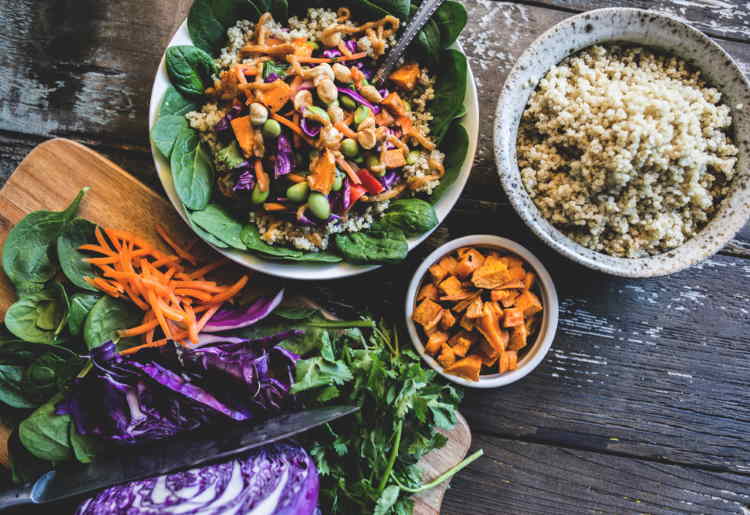As Healthline puts it, plant-based eating is “more of a lifestyle.”
This should come as a welcome relief to those just dipping their toes into plant-based eating. Unlike other diets that focus more on what to eliminate, plant-based diets emphasize what you should be increasing.
Still, what is a plant-based diet? If you’re new to the movement, or overwhelmed by contradictory definitions, it helps to break it down to its core components:
Plant: as in food that comes from plants as opposed to animals
Based: as in, “centered on” or “structured around”
If you’re picturing bowls of lettuce and uncooked carrots, don’t worry. A plant-based diet is not an all-raw diet. It simply emphasizes fruits, vegetables, nuts, and whole grains without necessarily eliminating animal products and processed ingredients entirely.
The Nitty Gritty
In its simplest terms, plant-based diets focus on whole foods, foods that are derived from plants, and minimally-processed foods.Unlike raw food diets, though, these don’t have to be eaten in uncooked form. Plenty of traditional meals can be made to accommodate a plant-based diet. Essentially, it has more to do with ingredients than preparation.
A full list of “plant-based” foods would be endless, but a quick breakdown of categories includes:
- Fruits
- Vegetables
- Whole grains such as brown rice, oats, quinoa, barley, and millet
- Legumes such as beans, peas, chickpeas, lentils, and peanuts
- Tofu, tempeh, and other plant-based proteins
- Nuts and nut butters such as cashews, almonds, walnuts, tahina, and natural peanut butter
Health Benefits of a Plant-Based Diet
Studies have shown that plant-based diets can significantly increase physical and cognitive health. Obesity, cancer, heart disease, and diabetes are just a few common health risks that can be reduced by eating whole foods and meals with more plant-based ingredients.
The landmark event that vaulted plant-based eating into the mainstream was the result of a 20-year study by Cornell University, the Chinese Academy of Preventive Medicine, and the University of Oxford.
The study, which included more than 6,500 adults in 65 counties in China, focused on diet and nutrition. One of the biggest takeaways was a direct link between cancer and those with diets high in animal proteins. The results were printed in a book called “The China Study,” which skyrocketed to the bestseller list, made plant-based eating a household term, and even converted notables such as Bill Clinton.
Since then, scientists and nutritionists have continued to study the effects of plant-based eating. The Journal of the American Heart Association concluded that eating more plant-based foods, and less animal-products, was a huge contributor to cardiovascular health. Healthline cites a series of studies showing that people on plant-based diets lost around 4.5 pounds over 18 weeks, substantially more than their animal-eating counterparts.
Further studies have shown that plant-based foods can lead to reduced body mass index (BMI), lower cholesterol levels, and even increased cognitive ability.
And of course there is preventional health. A plant-based diet increases your intake of fiber, antioxidants, vitamins, and minerals, all of which are vital for optimal nutrition and disease prevention. Eating more greens, fruits, and nuts can improve everything from digestive functions to daily mood and energy levels.
How to Maintain a Plant-Based Diet
The upside to the plant-based diet not having strict guidelines is that you don’t need to either. Following Healthline’s advice and approaching it more as a lifestyle can take some of the pressure off, and inspire you to focus on what to eat rather than what you need to eliminate.
Start by assessing your diet and locating the areas where you’re deficient in greens or fruits. In particular, try to tweak your meals so that they’re anchored by a plant-based ingredient rather than meat or eggs. You can find plenty of healthy plant-based recipes online, as well as meal delivery services that specialize in meals made entirely from whole grains, vegetables, and plant-based proteins.

